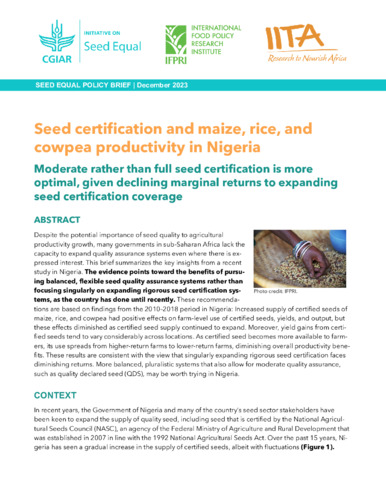Seed certification and maize, rice, and cowpea productivity in Nigeria
Abstract
Despite the potential importance of seed quality to agricultural productivity growth, many governments in sub-Saharan Africa lack the capacity to expand quality assurance systems even where there is expressed interest. This brief summarizes the key insights from a recent study in Nigeria. The evidence points toward the benefits of pursuing balanced, flexible seed quality assurance systems rather than focusing singularly on expanding rigorous seed certification systems, as the country has done until recently. These recommendations are based on findings from the 2010–2018 period in Nigeria: Increased supply of certified seeds of maize, rice, and cowpea had positive effects on farm-level use of certified seeds, yields, and output, but these effects diminished as certified seed supply continued to expand. Moreover, yield gains from certified seeds tend to vary considerably across locations. As certified seed becomes more available to farmers, its use spreads from higher-return farms to lower-return farms, diminishing overall productivity benefits. These results are consistent with the view that singularly expanding rigorous seed certification faces diminishing returns. More balanced, pluralistic systems that also allow for moderate quality assurance, such as quality declared seed (QDS), may be worth trying in Nigeria.

